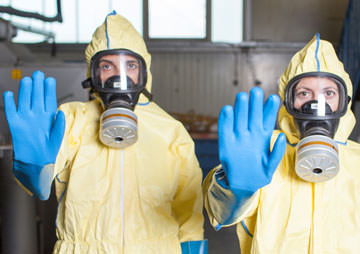Nurse Union Accuses Texas Hospital of Sloppy, Dangerous Handling of Ebola Threat
The biggest union of registered nurses in the country says it has spoken with workers at the hospital in Dallas where a man died of Ebola and two nurses have been infected, and it reports a level of carelessness that boggles the mind. Shutterstock
Shutterstock
The biggest union of registered nurses in the country says it has spoken with workers at the hospital in Dallas where a man died of Ebola and two nurses have been infected, and it reports a level of carelessness that boggles the mind.
National Nurses United says it was contacted by nurses at Texas Health Presbyterian Hospital Dallas “out of frustration with a lack of training and preparation.”
The union’s full brief is below, but here are some of the shocking details.
The patient, Thomas Eric Duncan, was not put into isolation for hours when he came in with a suspected case of Ebola (this is after he returned to the hospital for a second visit). His blood samples were reportedly “sent through the hospital tube system without being specially sealed and hand delivered.” Nurses who tended to Duncan were treating other patients, the union says. Nurses were not, they say, given the necessary protective equipment or the training on how to use it. “The nurses say there were no protocols,” the group reports.
The result is that two nurses at the hospital have been infected with the deadly disease and, according to the Dallas Morning News, as many as 70 people are at risk of infection.
Although Ebola is a deadly virus, we know how it is transmitted and there is no excuse for a hospital in the wealthiest country on earth to allow its spread. According to USA Today, National Nurses United wants President Obama to mandate a national standard for Ebola care.
The full report from National Nurses United is below.
— Posted by Peter Z. Scheer
Your support matters…Statement by RN’s at Texas Health Presbyterian Hospital as provided to National Nurses United
National Nurses United, 10/15/14
This is an inside story from some registered nurses at Texas Health Presbyterian Hospital in Dallas who have familiarity with what occurred at the hospital following the positive Ebola infection of first the late Thomas Eric Duncan and then a registered nurse who cared for him Nina Pham.
The RNs contacted National Nurses United out of frustration with a lack of training and preparation. They are choosing to remain anonymous out of fear of retaliation.
The RNs who have spoken to us from Texas Health Presbyterian are listening in on this call and this is their report based on their experiences and what other nurses are sharing with them. When we have finished with our statement, we will have time for several questions. The nurses will have the opportunity to respond to your questions via email that they will send to us, that we will read to you.
We are not identifying the nurses for their protection, but they work at Texas Health Presbyterian and have knowledge of what occurred at the hospital.
They feel a duty to speak out about the concerns that they say are shared by many in the hospital who are concerned about the protocols that were followed and what they view were confusion and frequently changing policies and protocols that are of concern to them, and to our organization as well.
When Thomas Eric Duncan first came into the hospital, he arrived with an elevated temperature, but was sent home.
On his return visit to the hospital, he was brought in by ambulance under the suspicion from him and family members that he may have Ebola.
Mr. Duncan was left for several hours, not in isolation, in an area where other patients were present.
No one knew what the protocols were or were able to verify what kind of personal protective equipment should be worn and there was no training.
Subsequently a nurse supervisor arrived and demanded that he be moved to an isolation unit– yet faced resistance from other hospital authorities.
Lab specimens from Mr. Duncan were sent through the hospital tube system without being specially sealed and hand delivered. The result is that the entire tube system by which all lab specimens are sent was potentially contaminated.
There was no advance preparedness on what to do with the patient, there was no protocol, there was no system. The nurses were asked to call the Infectious Disease Department. The Infectious Disease Department did not have clear policies to provide either.
Initial nurses who interacted with Mr. Duncan nurses wore a non-impermeable gown front and back, three pairs of gloves, with no taping around wrists, surgical masks, with the option of N-95s, and face shields. Some supervisors said that even the N-95 masks were not necessary.
The suits they were given still exposed their necks, the part closest to their face and mouth. They had suits with booties and hoods, three pairs of gloves, no tape.
For their necks, nurses had to use medical tape, that is not impermeable and has permeable seams, to wrap around their necks in order to protect themselves, and had to put on the tape and take it off on their own.
Nurses had to interact with Mr. Duncan with whatever protective equipment was available, at a time when he had copious amounts of diarrhea and vomiting which produces a lot of contagious fluids.
Hospital officials allowed nurses who had interacted with Mr. Duncan to then continue normal patient care duties, taking care of other patients, even though they had not had the proper personal protective equipment while caring for Mr. Duncan.
Patients who may have been exposed were one day kept in strict isolation units. On the next day were ordered to be transferred out of strict isolation into areas where there were other patients, even those with low-grade fevers who could potentially be contagious.
Were protocols breached? The nurses say there were no protocols.
Some hospital personnel were coming in and out of those isolation areas in the Emergency Department without having worn the proper protective equipment.
CDC officials who are in the hospital and Infectious Disease personnel have not kept hallways clean; they were going back and forth between the Isolation Pod and back into the hallways that were not properly cleaned, even after CDC, infectious control personnel, and doctors who exited into those hallways after being in the isolation pods.
Advance preparation
Advance preparation that had been done by the hospital primarily consisted of emailing us about one optional lecture/seminar on Ebola. There was no mandate for nurses to attend trainings, or what nurses had to do in the event of the arrival of a patient with Ebola-like symptoms.
This is a very large hospital. To be effective, any classes would have to offered repeatedly, covering all times when nurses work; instead this was treated like the hundreds of other seminars that are routinely offered to staff.
There was no advance hands-on training on the use of personal protective equipment for Ebola. No training on what symptoms to look for. No training on what questions to ask.
Even when some trainings did occur, after Mr. Duncan had tested positive for Ebola, they were limited, and they did not include having every nurse in the training practicing the proper way to don and doff, put on and take off, the appropriate personal protective equipment to assure that they would not be infected or spread an infection to anyone else.
Guidelines have now been changed, but it is not clear what version Nina Pham had available.
The hospital later said that their guidelines had changed and that the nurses needed to adhere to them. What has caused confusion is that the guidelines were constantly changing. It was later asked which guidelines should we follow? The message to the nurses was it’s up to you.
It is not up to the nurses to be setting the policy, nurses say, in the face of such a virulent disease. They needed to be trained optimally and correctly in how to deal with Ebola and the proper PPE doffing, as well as how to dispose of the waste.
In summary, the nurses state there have been no policies in cleaning or bleaching the premises without housekeeping services. There was no one to pick up hazardous waste as it piled to the ceiling. They did not have access to proper supplies and observed the Infectious Disease Department and CDC themselves violate basic principles of infection control, including cross contaminating between patients. In the end, the nurses strongly feel unsupported, unprepared, lied to, and deserted to handle the situation on their own.
We want our facility to be recognized as a leader in responding to this crisis. We also want to recognize the other nurses as heroes who put their lives on the line for their patients every day when they walk in the door.
Independent journalism is under threat and overshadowed by heavily funded mainstream media.
You can help level the playing field. Become a member.
Your tax-deductible contribution keeps us digging beneath the headlines to give you thought-provoking, investigative reporting and analysis that unearths what's really happening- without compromise.
Give today to support our courageous, independent journalists.





You need to be a supporter to comment.
There are currently no responses to this article.
Be the first to respond.